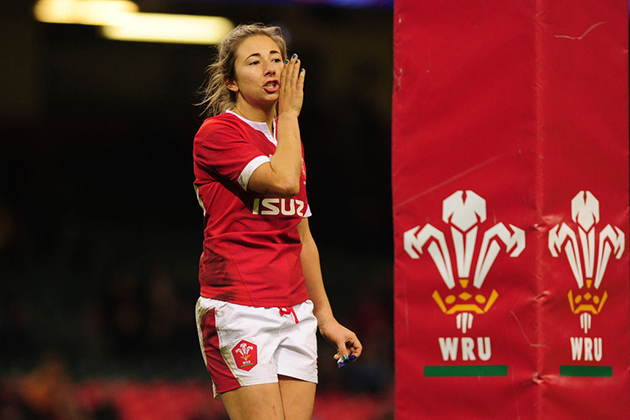The Wales fly-half discusses her work with School of Hard Knocks and her hopes for the future of the women’s game
Elinor Snowsill on rugby’s transformative effects
Last year Elinor Snowsill was going viral for a behind-the-back kick while playing for the Barbarians against the USA. That may not have led to a change in tactics, but the Wales fly-half is aware of rugby’s ability to change lives. Here she explains more…
I’m lead coach for the School of Hard Knocks schools programme in Wales. There are two different programmes. The adult one is an eight-week intensive course and focuses on getting people back into work or education. Then they decided to have a preventative programme in schools.
I turned down a really good job to work one day a week with SOHK. I was going to teach A Level psychology but the WRU asked if I’d be interested in doing coaching with SOHK. I went to see what they did and fell in love with it – it’s the perfect job for me. It’s rugby and challenging behaviour.
Snowsill shares experiences with School of Hard Knocks
Elinor Snowsill will be wearing red tomorrow but whoever she represents on the international stage, she shares the experiences with her School of Hard Knocks pupils – and she thinks some of them, such as these girls at Cantonian High, could follow in her footsteps. Her stint with the Barbarians was certainly a moment to share.
Posted by The Welsh Rugby Union on Friday, November 29, 2019
There’s always a reason behind behaviour and I do one-on-one mentoring to find out what’s going on. I’m in my third year with SOHK and now do five days a week.
The school identifies a group they want us to work with – most of mine are girls in Years Eight and Nine. The first hour is on personal development. We have a loose curriculum but it depends on their needs. One group were fighting a lot so we did a session on ‘One punch, one kill’. The second hour is rugby training and we also take them on trips to play other SOHK teams.
Not many sports can be as effective as rugby at changing behaviour. Firstly, respect is huge and that’s something we instil in the kids. It’s not just respecting the ref but coaches, team-mates…
The second thing is the power of the team; how we build them together to make the SOHK team, earning the kit and being part of it.
Rugby wouldn’t be as successful if it wasn’t a contact sport. The physical aspect, the contact part, is the third thing. It’s that ability to be physical but not be told off for it. Instead of fighting, kids can learn to put in a big tackle and the rewards of that. They learn how to channel their aggression.
I’d like to set up a private school for kids like the ones I work with to come to free. They could stay at the school all week because for some kids home can be a toxic environment and the reason they struggle to behave. If you take them out of that environment, you can work closely with them. It’s an idea at the moment, but if anyone wants to fund it get in touch!
I’d love to be a high-level head coach one day. With a women’s team, because I understand girls a bit more. I’ve done my Level One course and I’m working with the WRU to get more badges.
It’s really important to have more female coaches in the game. It’s an opportunity for retired players to help inspire the next generation. There was only one female in the (Women’s) Six Nations coaching teams. It shows how much we need to push our recruitment on.
The next step is realising we’re not mini men, we’re women. It’s an exciting time to be part of sport and looking at what works for women rather than just replicating what men do. Since the story about Chelsea FC (planning training around menstrual cycles), there’s been a lot more talk around it. We (Wales Women) have a female general manager, Charly Wathan, and I think she’d implement something like that.
Like..what?!? ? https://t.co/YrlZ5IvogT
— Elinor Snowsill (@elsnowsill) September 12, 2020
When I was in school, kids would put tomboys back in their box by calling them a lesbian. It definitely had an impact on how I felt about myself and is probably the reason I took so long – I was 23 – to come out to friends and family.
Does coming out still have to be a thing? In my world it doesn’t but I was asked to do a documentary for S4C when there’d been a few homophobic attacks across the UK and I’d heard about a couple of people who were struggling to come out to their family. If I could make a difference in people’s attitudes that would be great.
From a results perspective, Wales are not in great shape. But if you saw what we’re doing behind the scenes, it’s exciting. We lost all our games in the Six Nations, but parts of the rugby we played are the best I’ve been involved in.
I’m excited to see where we are come the 2021 World Cup. I think this will be the best World Cup ever. I’ve been lucky to play in other World Cups and it’s a real privilege. This one will be totally different because it’s on the other side of the world in New Zealand. The furthest I’ve been for a World Cup before is Paris!
This article originally appeared in the June 2020 edition of Rugby World magazine.
Follow Rugby World on Facebook, Instagram and Twitter.





